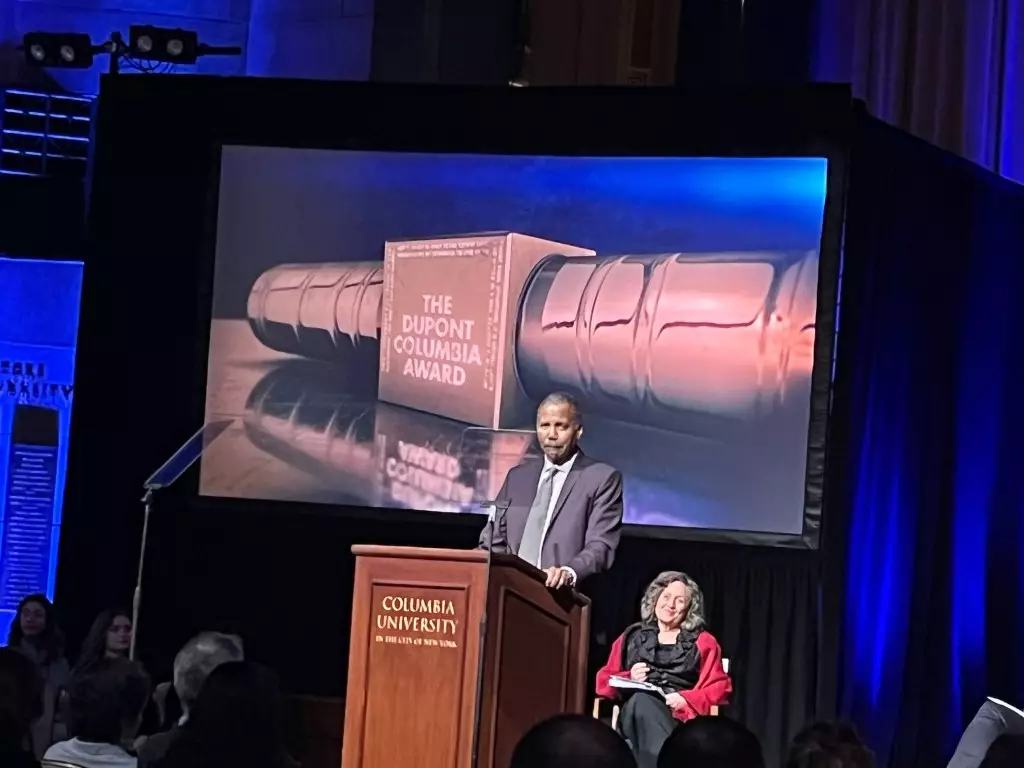The creative landscape of journalism has seen a significant shift in recent years, with streaming platforms increasingly recognized for their contributions to serious journalism. The 2025 duPont-Columbia Awards marked a historic moment in this transformation, as three streaming services—Netflix, Max, and Paramount+—received prestigious honors typically reserved for established networks. This acknowledgment signifies not just a change in medium but a broader acceptance of diverse storytelling methods and platforms in the pursuit of journalistic excellence.
On a night filled with anticipation, the Columbia Journalism School unveiled its 16 winners during a ceremony at the Upper Manhattan campus. While streaming services showcased their innovative storytelling, traditional stalwarts like Frontline and 60 Minutes were conspicuously absent from this year’s accolades. This absence opens up the broader question: Are we witnessing a shift in audience preferences, or is it indicative of a deeper issue within traditional media practices and their engagement with contemporary issues?
As the ceremony unfolded, billowing clouds of uncertainty surrounded the media industry, most notably in the context of Donald Trump’s second term as president. Bill Whitaker, renowned correspondent for 60 Minutes, and Steve Inskeep of NPR’s Morning Edition co-hosted the event. Their comments resonated with the current zeitgeist of journalism, encapsulating both the challenges and the pressing need for integrity in reporting. Whitaker highlighted the paradox facing journalists today: on one hand, they are celebrated for their commitments, while on the other, they contend with increasing skepticism from the public and hostile political sentiments.
In a particularly poignant moment, Whitaker referred to the current climate as “a fraught time for journalism.” With wars raging across multiple countries, and journalists facing heightened risks, the overall picture is sobering. Media outlets must navigate an environment where their credibility is constantly in question, as political figures label them “enemies of the people.” Whitaker’s stirring call to arms reminded journalists of their responsibilities: to “keep digging” and “keep shining light into the shadows,” emphasizing that the health of democracy relies on fearless, factual reporting.
Steve Inskeep built on Whitaker’s sentiments, candidly addressing the growing mistrust in media. His comments underscored a critical point: journalism must go beyond mere narratives; it should strive to reach those who may not initially care about the news or be inclined to distrust its sources. In an era marked by division and ideological fractures, Inskeep’s remarks resonated with urgency—a call for journalists to break through the noise and engage with audiences that may be skeptical of their intentions.
In the face of adversity, the award ceremony reiterated the media’s imperative to uphold rigorous standards and to be transparent. The recognition of works by Netflix, Max, and others illustrated that substantive storytelling can and does thrive outside traditional broadcast frameworks. The streaming platforms have managed to capture compelling narratives that resonate with contemporary audiences, a feat most conventional outlets have struggled with in recent years.
The awarded productions that emerged from streaming services included significant docuseries and documentaries addressing crucial social themes such as race in America. For instance, the documentary “Murder in Boston,” produced by HBO | Max, delves into the complexities surrounding urban crime and societal challenges. Similarly, “Birthing A Nation: The Resistance of Mary Gaffney” by MTV Documentary Films and Paramount+ examines historical injustices through the lens of modern perspectives. These projects are testaments to how streaming services harness storytelling to explore deeper societal implications, echoing the values upheld by traditional journalism.
Other notable winners included NPR for its compelling coverage of the Gaza conflict and the investigative series from The Outlaw Ocean Project on seafood sustainability in China. The diversity in these topics signifies a renewed emphasis on multifaceted narratives that transcend traditional news beats, addressing global issues overlooked by mainstream outlets.
The Future of Journalism: Navigating Challenges Ahead
As the 2025 duPont-Columbia Awards highlighted the achievements of a new generation of journalism—both from traditional and streaming platforms—the future of reporting remains uncertain yet promising. The acceptance of online and documentary formats signifies a profound transformation in how news is consumed and produced, challenging traditional norms that have long governed the industry.
With an evolving landscape, media professionals must remain vigilant in combating cynicism and work diligently to restore public confidence. As established and new organizations navigate these turbulent waters, commitment to truth and ethical reporting will be paramount. In a world fraught with misinformation, the responsibility lies heavily on journalists to not just report the news, but to engage, inform, and uplift the indivisible threads of democratic society.


Leave a Reply